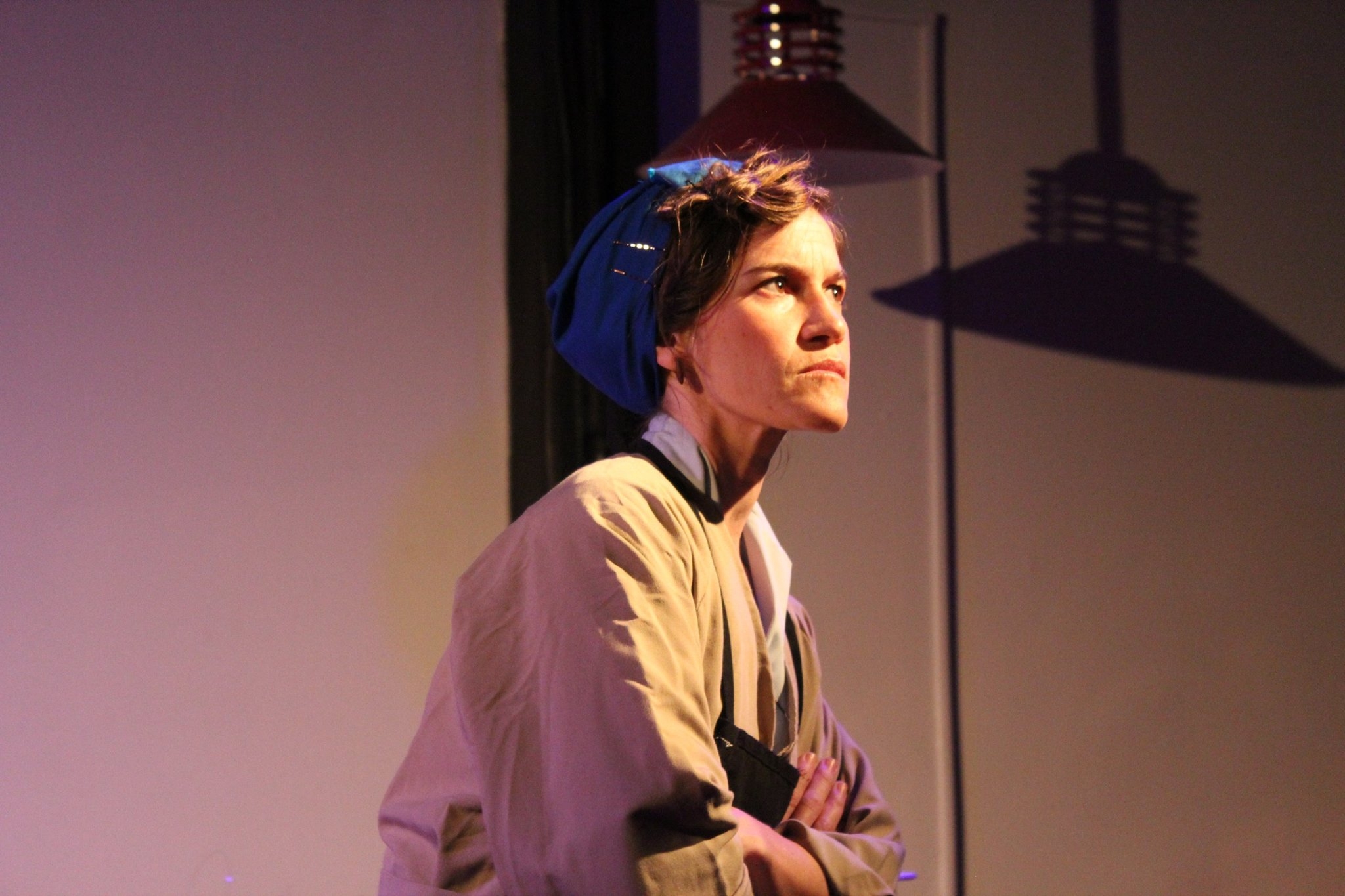By now, most people are familiar with Rosie the Riveter, the symbol representing the legions of women who filed into the workplace during World War II to take over the jobs of men sent overseas. Often, they were working to aid the war effort.
But in Kalamazoo’s legendary Gibson Guitar factory, dozens of female employees were secretly crafting musical instruments instead: The company denied it was manufacturing guitars during the early 1940s, although it somehow shipped 25,000 of them during that time period. Incredibly, despite photographic evidence and documentation, Gibson executives still maintain a code of silence about the “Gibson Girls” nearly 75 years later.
These phantom figures are given human faces and credible backstories in Cara Beth Heath’s “Good Enough,” inspired by John Thomas’ book “Kalamazoo Girls” and presented by Bare Backstage Productions and Metallic Mannequin Company.
It’s immersive theater, since director Kevin Dodd has transformed Crawlspace Eviction’s cozy performance space in the Park Trades Building into three areas in the Gibson factory: the string room, where most of the women work; the break room, where they swap gossip and wisecracks; and the basement, where the most dedicated guitar maker, Mary Jane (Bekah Mitton), spends hours lovingly crafting the bodies for the instruments.
“People out there need something to hold on to,” Mary Jane says of her creations, and she’s frequently infuriated by the higher-ups’ willingness to compromise on quality by substituting substandard materials.
Mary Jane uses the job as a much-needed distraction from a miserable home life with a drunken husband and her unfulfilling after-work romps with the town’s “4-Fs,” the men rejected by the draft board for one reason or another. Her co-workers are no less eager to forget their troubles. Jittery Helen (Michelle Ringle-Barrett) is trying, not very successfully, to hide a secret. Jenny (Sarah Kolber) makes a show of her gift for coiling the guitar strings without bending them. Irene (MerryRose Howley) is outwardly concerned about her missing-in-action fiancé, although she confesses he’s been away so long “I forget that he’s real.” Recently hired June (Sarah Quigley) strikes some discordant notes with her hard-boiled attitude and her insistence on wearing pants (a fashion choice that verged on the scandalous in 1944).
Presiding over the crew is haughty executive secretary Gladys (Sarah Maclean), who routinely sweeps through the factory like a storm queen, clutching a clipboard to her chest as if it were a shield. When Mary Jane balks at being reassigned, Gladys mocks her craftsmanship: “It’s not exactly art – it looks like gluing two pieces of wood together. Schoolchildren could do it.” Unsurprisingly, when Mary Jane challenges Gladys to help assemble a guitar body, Gladys botches the task spectacularly.
Heath weaves the various story strands into a poignant piece that smoothly balances pathos and humor (particularly when Helen’s feathers are ruffled by June’s skepticism about cowboy singing star Gene Autry’s recent visit to the factory).
In contrast to many of the movies made about homefront life in the days leading up to Victory in Europe Day, “Good Enough” pointedly shows the war-weariness that had diluted some people’s patriotic fervor by 1944. When Gladys proclaims Gibson will begin manufacturing radar boards instead of guitars, some of the women gripe about the changes and wonder what the future holds in store for them once the war is over and scores of veterans come back.
The play’s most notable flaw is its brevity: Less than 90 minutes is not enough time to give each of these characters the attention and dimension they deserve. Hopefully, Heath is planning on expanding “Good Enough” from one act to two to allow herself to give each intriguing personality a little more room to breathe.
Mary Jane spends the most time in the spotlight, and Mitton is first-rate, packing a potent combination of pride and wounded wistfulness into her monologues about the guitars she slaves over. Howley makes Irene’s girlish uncertainty about her place in the world quietly tragic, and Quigley is suitably snappy and sassy as June, who seems to have been born about 20 years before her time. Maclean has few peers when it comes to playing emotionally guarded, no-nonsense types who are dangerously close to their breaking points, and Gladys evolves subtly and strikingly from a strutting, self-satisfied priss into an anxious woman working overtime to keep her act together.
Dodd makes excellent use of the theater’s wide playing space, occasionally cutting back and forth between action on either side to create a sort of theatrical split-screen. The only noticeable problem on opening night was a sound system that buzzed and hummed whenever the lighting was adjusted. But the material and the sturdy ensemble work easily drowned out those sour sounds.





